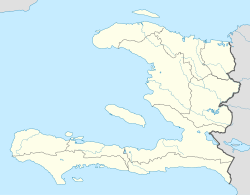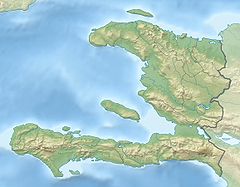Saint-Marc, Haiti
| Saint-Marc | |
|---|---|
| Commune | |

Saint-Marc Welcome Sign at Frecyneau
|
|
| Location in Haiti | |
| Coordinates: 19°7′0″N 72°42′0″W / 19.11667°N 72.70000°WCoordinates: 19°7′0″N 72°42′0″W / 19.11667°N 72.70000°W | |
| Country |
|
| Department | Artibonite |
| Arrondissement | Saint-Marc |
| Population (2003 Census) | |
| • Total | 160,181 |
| Climate | BSh |
|
Haiti
|
|
| Location | Pointe de Saint-Marc Artibonite Department Haiti |
|---|---|
| Coordinates | 19°02′44.6″N 72°49′12.7″W / 19.045722°N 72.820194°W |
| Year first constructed | 1924 |
| Foundation | concrete basement |
| Construction | metal skeletal tower |
| Tower shape | square pyramidal skeletal tower |
| Markings / pattern | white tower |
| Height | 12 metres (39 ft) |
| Focal height | 29 metres (95 ft) |
| Light source | solar power |
| Range | 9 nautical miles (17 km; 10 mi) |
| Characteristic | Q (9) W 15s. |
| Admiralty number | J5404 |
| NGA number | 14224 |
Saint-Marc (Haitian Creole: Sen Mak) is a commune in western Haiti in Artibonite. Its geographic coordinates are 19°7′N 72°42′W / 19.117°N 72.700°W. At the 2003 Census the commune had 160,181 inhabitants. It is the biggest city between Port-au-Prince and Cap-Haïtien.
The port of Saint-Marc is currently the preferred port of entry for consumer goods coming into Haiti. Reasons for this may include its location away from volatile and congested Port-au-Prince as well as its central location relative to a large group of Haitian cities including Cap-Haïtien, Carrefour, Delmas, Fort-Liberté, Gonaïves, Hinche, Limbe, Pétion-Ville, Port-de-Paix, and Verrettes. These cities, together with their surrounding areas, contain nearly eight million of Haïti's ten million people (2009).
In 1905 the Compagnie Nationale or National Railroad built a 100 km railroad north to Saint-Marc from the national capital of Port-au-Prince. The track was later extended another 30 km east to Verrettes.
...
Wikipedia


